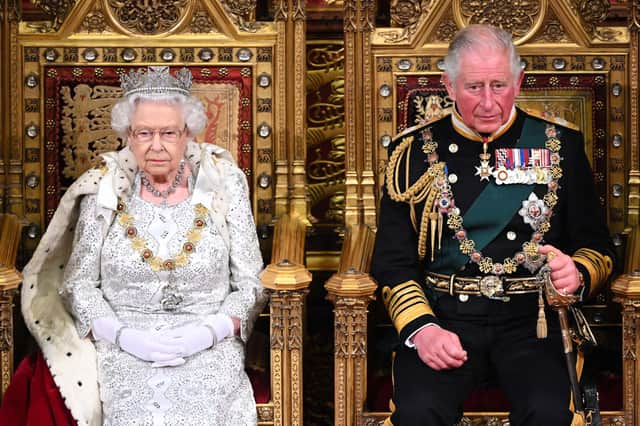Owen Polley: The Queen provided Charles a model of how to reign


The monarchy experienced instability and difficulties during her reign, as it adjusted to an uncertain world and the unrelenting attention of the modern media. But Her Majesty steered it through rough patches, overseeing changes where changes were needed, while protecting the traditions that made the crown one of the UK’s most cherished institutions.
She knew when to be formal and detached, to preserve the grandeur and authority of the Royal Family, and when to be playful; having tea with Paddington during the jubilee, for example, or appearing alongside James Bond at the Olympics opening.
Advertisement
Hide AdAdvertisement
Hide AdWe all realised, if we thought about it, that the Queen would not be with us for many more years. She stayed healthy and active well into her nineties, but while we celebrated her longevity, it was a reminder that the nation would eventually lose her.
Over the past 15 months this realisation was sharpened by Prince Philip’s death, the jubilee celebrations and some well-publicised mobility problems. After a lifetime of impeccable service, the Queen struggled to fulfil a full programme of engagements, even though her work ethic was astonishing for a 96-year-old.
We knew rationally that she would die, and not decades in the future, but her passing still caused shock, and anxiety about the future. It’s very different thinking about the death of a ubiquitous national figure theoretically and confronting the reality.
We may not have appreciated it at the time, but we were lucky to live in a second Elizabeathen age. More so than any previous monarch, she reigned during an era when anti-establishment feeling and republican sentiment were widespread, if not commonplace. Even among opponents of the monarchy, though, there was an understanding that the Queen had conducted herself well over her 70 years on the throne and offered a lifetime of reliable, dignified public service.
Advertisement
Hide AdAdvertisement
Hide AdThere were critics who pointed out that she lived a privileged life, enjoying material luxuries thanks to an accident of birth. However, it was doubtful that many of them would have swapped their comparatively anonymous lives for the kind of incessant scrutiny that she lived with. Nor would they have been able to exercise the type of discipline required to put their own needs and feelings consistently behind those of the nation and the crown.
Those were virtues that were instilled in the Queen from an early age, but, even with that training, she must sometimes have struggled to live up to them. It will be difficult for the new king, Charles, to emulate her spirit of self-sacrifice. Indeed, there are valid reasons to worry that he will not draw the nation together as effectively as his mother. She was, after all, a uniquely unifying figure.
We received only oblique hints about the Queen’s political opinions, even though she was acknowledged to be exceptionally well-informed and interested in current issues. She intervened subtly during the Scottish independence referendum, for example, urging voters to think ‘very carefully’ about their choice.
In contrast, we think, at least, that we know a lot about the new king and his opinions. For years, The Guardian fought a legal battle to expose Charles’ so-called ‘black spider letters’ that lobbied government ministers on some of his pet issues. The correspondence, when it was eventually published, was innocuous, but if the King is going to be as reticent about intervening in politics as his mother, then it will require a change of approach.
Advertisement
Hide AdAdvertisement
Hide AdEqually, the Queen’s private life was less colourful and attracted less coverage than that of the new monarch. For a time, Charles was relatively unpopular, due to the public’s lasting affection for his previous wife, Princess Diana. As the years progressed, though, the then prince became a less controversial figure and his second spouse, Camilla, won over the British public by performing her duties diligently. The King himself has struck a perfect note during his first days as monarch. At the same time, Charles’ succession involves an element of uncertainty.
Even the UK’s most intractable enemies are toning down their hostile rhetoric and paying tributes to the Queen, during a period of mourning and reflection. Inevitably, though, Her Majesty’s death will encourage nationalists in Scotland and Northern Ireland who thought that her popularity stood in the way of their separatist aspirations.
On the day after her passing, the Irish Times published a column claiming that the monarch’s demise was “an earthquake for Northern Irish unionists” and that “the days of happiness and gloriousness (are) over for unionism”. Most separatist commentators had the decency to keep their crowing to themselves, but we can expect more like this in the weeks to come.
Fortunately, the Queen’s example now defines the role of the sovereign in the United Kingdom. If the King follows her precedent even partly successfully, the monarchy will continue to provide a powerful and popular symbol that binds our country together.